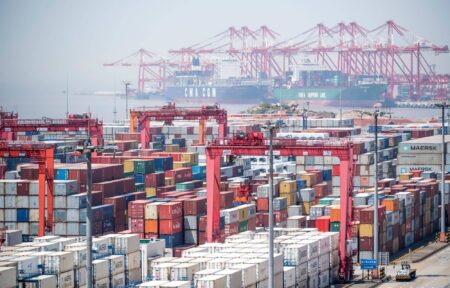- Small and medium enterprises have become vital drivers of economic growth in African countries.
- According to the African Development Bank Group, SMEs in Africa represent around 90 per cent of all businesses and contribute up to 33 per cent of Africa’s Gross Domestic Product (GDP).
- Access to capital is one of the biggest obstacles small and medium enterprises face in Africa.
Small and medium enterprises (SMEs) in Africa play a vital role in fostering sustainable development. With 90 per cent of all global businesses falling under the MSME category, these enterprises create employment, foster innovation, and contribute to gross domestic product (GDP) growth.
In recent years, small and medium enterprises have become vital drivers of economic growth in African countries. As the continent undergoes rapid development, these enterprises foster innovation, create jobs, and contribute to economic growth.
Small and medium enterprises form the bedrock of African economies, representing various businesses operating in multiple sectors. From production, agriculture, and processing to services and technology, these enterprises contribute largely to the GDP, employment, and poverty reduction.
Africa’s small and medium enterprises are also in charge of driving innovation and entrepreneurship. With the adoption of digital technologies like artificial intelligence (AI) and increased network connectivity, these enterprises exploit innovative solutions to address obstacles and meet society’s ever-changing needs. Whether it’s developing mobile strategies for financial inclusion or embracing sustainable agriculture practices, SMEs play a vital role in molding a more resilient and inclusive economy.
SMEs in Africa for economic growth
According to the African Development Bank Group, SMEs in Africa represent around 90 per cent of all businesses and contribute up to 33 per cent of Africa’s Gross Domestic Product (GDP). small and medium enterprises also account for about 40 per cent of the total employment in Africa, making them a crucial source of jobs on the continent.
African small and medium enterprises have experienced impressive growth in recent years, driven by the rapidly growing population, increasing consumer demand, and an improving business environment. The rise of technology and digital innovation also plays a crucial role in the growth of SMEs, as it has created new opportunities for entrepreneurs to start and scale their businesses.
One example of the growth and impact of small and medium enterprises in Africa is the rise of the “techpreneur” culture in countries such as Nigeria, Kenya, and South Africa.
These countries have witnessed a surge of innovative start-ups, such as Jumia Group, Andela, and Flutterwave, which have disrupted traditional industries and created new markets. These start-ups have attracted significant investment, which has helped them to expand rapidly and create new jobs.
One of the top countries experiencing a surge in SMEs is Nigeria. The country has a large and growing population, providing a ready market for businesses. In addition, the Nigerian government has implemented policies to support SMEs, including tax incentives and access to finance. These policies have led to the growth of various SMEs, including tech startups, fashion businesses, and agriculture ventures.
Another country experiencing a surge in SMEs is South Africa. The country has a well-developed private sector and a sophisticated financial market, which provides ample opportunities for SMEs. South Africa has also implemented policies to support SMEs, such as tax incentives and training programs. The country’s SME sector is diverse, with businesses in various industries, including healthcare, education, and tourism.
Kenya is also experiencing a surge in SMEs, particularly in technology and agriculture. The country has a large and growing consumer market, which provides opportunities for businesses to grow. The Kenyan government has implemented policies to support SMEs, including tax incentives and access to finance. The country has a vibrant startup ecosystem, with tech startups receiving significant investment.
Other countries experiencing a surge in SMEs across Africa include Ghana, Ethiopia, and Rwanda. These countries have implemented policies to support SMEs and have a growing consumer market, which provides opportunities for businesses to grow. The surge in SMEs across Africa is encouraging, creating jobs, and driving economic development. However, more must be done to support SMEs, including improving access to finance, providing training and mentorship, and implementing policies that reduce business entry barriers.
Read Also: Uganda Securities Exchange creates a new window for SMEs’ capital mobilisation
Challenges facing SMEs in Africa

Many African SMEs need reliable electricity, internet connectivity, and other basic infrastructure. This makes it difficult for them to reach new customers, access markets, and grow their businesses. In many cases, SMEs have to rely on expensive alternatives such as generators, private transport, and satellite communication systems, increasing operating costs. With adequate digital infrastructure, this enterprises can stay competitive in the global economy.
Access to capital is one of the biggest obstacles small and medium enterprises face in Africa. Many of these enterprises need more collateral and credit history to secure funding from traditional creditors. Most African SMEs are run in the informal sector, so they need more financial services from the formal sector, leaving them to informal lenders who charge exorbitant interest rates.
African small and medium enterprises often need help accessing regional and international markets due to various factors, including trade barriers and the need for more information. Limited market access means SMEs cannot compete with larger firms, limiting their growth and potential.
Regulatory barriers, including excessive bureaucracy, high taxes, and complex legal frameworks, are another obstacle SMEs face in Africa. These barriers make it difficult for SMEs to operate efficiently and can limit their growth potential.
Key to unlocking barriers in SMEs
Governments in Africa need to prioritise infrastructure development to overcome obstacles in businesses. This can be done through public-private partnerships that involve the government, private sector, and development partners. The private sector can provide technical expertise, while the government can provide the regulatory framework and funding. Development partners can also provide financial and technical assistance.
One of such partnership is the small and medium enterprises Accelerator Project initiated by Stride Enterprise Resource Planning (ERP) in collaboration with various industry partners.
Aside from the Stride ERP project, other possible solutions to African challenges exist. Governments can partner with financial institutions to create policies and incentives encouraging them to lend to small and medium enterprises. Moreover, financial institutions can leverage technology to develop innovative financial products accessible to theese enterprises.
Finally, governments and other organisations should develop training programs that help small and medium enterprises learn new skills and technologies, such as business process management, digital marketing, e-commerce, and supply chain management. This will improve their competitiveness and enhance their ability to scale up their businesses.
Conclusion

Moreover, by investing in small and medium enterprises, Africa can harness the force of entrepreneurship and tackle challenges, build resilience, and foster inclusive economic growth. As these enterprises continue to grow and expand, they without a doubt, play a key role in reshaping the future trajectory of the African continent.











